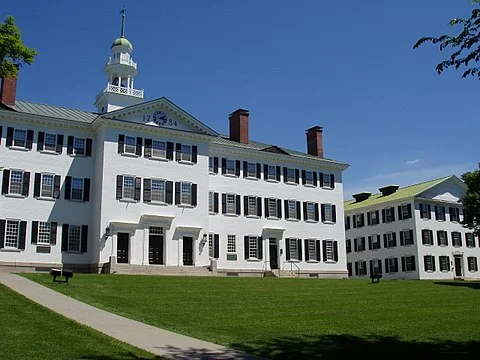Trump move against colleges' affirmative action on race is good news for affluent white students
Dartmouth Hall at Dartmouth College, in Hanover, N.H. Dartmouth is one of the four Ivy League universities in New England. The others are Harvard, Yale and Brown.
From Robert Whitcomb's "Digital Diary,'' in GoLocal24.com
That the Trump administration has decided that the federal government will no longer encourage colleges and universities to use race in the admissions process, reversing Obama-era guidance meant to promote diversity, will have the least effect on the nation’s richest, most prestigious and thus hard-to-get-into colleges and universities, of which New England has a lot. They get so many applicants and have so much financial aid to give out that they can easily create very diverse classes. The schools want to show such diversity in part because it reinforces their position as national and even international institutions. They want their students’ faces to look like the, well, world.
Using race as one criterion among others also has socio-economic-diversity effects– e.g., African-American and Hispanic students tend to come from poorer families than white and many Asian families.
Meanwhile, the Feds are investigating Harvard for alleged racial bias after complaints from some Asian-Americans that the admissions process is skewed against them.
Harvard has argued that it “does not discriminate against applicants from any group, including Asian-Americans’’ and notes that this group currently makes up a hefty 22.2 percent of students. But some rejected applicants say that’s too low considering their high marks and other indicators of future success.
We should leave to the colleges what sort of mix they need and want. Barring provable racial bias, the Feds shouldn’t try to manage colleges’ decision-making.
Trump’s policy, which will appeal to his mostly white base, will mean that poorer schools (public and private) will be less likely to offer admission to minorities. They’ll become whiter even as the Ivy League and other highly selective colleges maintain their affirmative-action programs. Poorer, less prestigious schools could try to maintain racial diversity indirectly, especially by providing more financial aid on the basis of a family’s finances – again, African-Americans and Hispanics tend to be considerably poorer than whites – but in a time of fiscal austerity for many colleges and universities and a shrinking number of overall applications because of demographic change, don’t bet on it.
The Trump policy will tend to favor affluent whites and widen the class divide.
